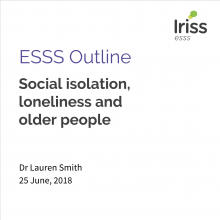This Insight focuses on improving support for black and minority ethnic (BME) carers.
Key points
- BME carers face particular difficulties in accessing and using support services, over and above those experienced by white carers
- Low uptake of services by BME carers cannot be attributed to their lack of interest in receiving support
- Many BME carers are unaware of the services that exist to support them
- A lack of language-matched information is perceived by BME carers to be among the greatest barriers to accessing services
- There is a need for culturally competent services, based on culturally appropriate and language- matched assessment processes
- Planners and providers of health and social care services have a legal duty to offer services that are accessible and appropriate to all sectors of the community, irrespective of ethnic origin
Black and Minority Ethnic carers
Carers from Black and Minority Ethnic (BME) communities, in common with carers more generally, work tirelessly in support of those they care for, often without pay or recognition and often to the detriment of their own health and well-being. While BME and white carers face similar difficulties in their caring role (namely high levels of stress and difficulties securing paid employment), BME carers are known to experience unique challenges in accessing support services. These challenges arise in the main from a lack of self-identification among BME individuals of their status as carers and hence an absence of policy recognition of their needs, compounded by stereotypical assumptions of how their needs are, or should be, met.
People from BME communities do not constitute a homogenous group and have diverse support needs. Although the 2001 Census identified 6,815 BME carers in Scotland, policy documents are replete with statements about the difficulty of obtaining accurate information about the size and nature of the BME carer population. Even when BME carers are identified, research indicates that they face numerous barriers in accessing and using services. These barriers relate to and include communication difficulties, a lack of culturally competent services, the increased isolation experienced by refugees and asylum seekers and a lack of understanding by BME carers about how services can support them.
In recent years, research and legislation have helped to place carers' circumstances near the top of the policy agenda. Increasingly carers' needs are being assessed independently from those they care for and addressed through tailored support services. At the same time, it is becoming increasingly apparent that carers from BME communities are not being adequately supported and that greater efforts have to be made to reach out to these individuals and to design services in line with their distinct and diverse needs.
Legislative and policy context
The expansion of equalities legislation has become a key driver for organisational change. The Race Relations (Amendment) Act 2000 extends obligations created under the Race Relations Act of 1976 and strengthens the duty on local authorities and other public bodies to eliminate unlawful racial discrimination and to promote equality of opportunity and good race relations in the delivery of public services. More recently, the Equality Act 2010 has sought to make discrimination law more streamlined; described as a 'cross-cutting legislative framework,' the Act seeks to protect individuals from direct discrimination and harassment based, among other things, on race and religion and to promote a more equal society (Government Equality Office, 2010).
In line with legislative change, the Scottish Government has moved to implement policies that recognise the needs of BME communities and carers within those communities. In its 2005 report The Future of Unpaid Care in Scotland, the Scottish Government made explicit recognition of the barriers faced by BME carers in accessing and using services and called for the need to reflect critically on 'Eurocentric models of care' and to 'ensure that carers from BME groups are included more readily as partners in care' (p31). The Scottish Government's latest strategy Caring Together pushes the racial equality agenda still further by urging local authorities to take into account the specific cultural and linguistic needs of minority groups and by insisting that all local authorities from 2011-12 onwards identify hard to reach groups, including BME communities.
The evidence: Key issues
While law and policy oblige service providers to move away from mono-cultural services, research evidence suggests that implementing change is far more difficult in practice. In Scotland, the challenge is complicated by a lack of ethnic monitoring and assessment and thereby a lack of detailed information on the varied needs of BME carers. Where efforts have been made to identify the needs of BME carers, research suggests that the uptake of services by BME carers is extremely low. A study undertaken with ethnic carers of older people in Edinburgh and the Lothians found that almost 70% of carers did not use any of the services provided by social work or by voluntary organisations (Netto,1996).
Low take-up of support by BME carers can no longer be taken as evidence that they do not want assistance. Among those mentioned above, 40% expressed an interest in using home helps, a third had an interest in a sitter service and a quarter said they would be interested in receiving personal care service (Netto, 1996). Nor can low take-up be viewed as evidence that BME communities are simply 'looking after their own' (Chahal and Ullah, 2004 p4). Although family support exists across minority ethnic communities, research indicates that such support cannot be taken for granted (Chahal and Ullah, 2004; Hubert, 2006). Instead, low-take up of services by BME individuals has been shown to result mainly from a lack of information of their availability and from significant difficulties accessing services.
Barriers in accessing and using support services
Recent studies have found that BME carers fail to access support because they are often unaware that such support exists. In the Edinburgh and Lothian study, it was found that three quarters of the carers interviewed had not been in contact with a social work department because they lacked information on how social work departments could help them (Netto,1996). Language barriers were cited as the central reason why BME carers had poor knowledge of entitlement and information about services. More recent studies have pointed to communication problems as the greatest barrier to effective access and use of services among BME carers (Flynn, 2002; National Assembly for Wales, 2003a; Chahal and Ullah, 2004).
Barriers to accessing support are compounded by carer difficulties in obtaining carer assessments. In a Welsh study, only a few of the 43 BME carers interviewed understood the meaning of 'carer assessment'. Others in the study said that they had not been offered an assessment, while still others said that they did not know they were entitled to it. Those who were aware of assessments said that meeting basic needs around food and shelter were a greater priority that securing support for their caring role (National Assembly for Wales, 2003b). Similar findings were highlighted by a study on support for Asian carers which found that only three carers from a group of 26 were certain that they had received a formal assessment. (Hepworth, 2003).
BME carers who have been assessed and are receiving support often value the support they receive. Many others, however, report that their cultural needs relating to gender, religion and diet are not being met by service providers. In many instances, carers from BME communities feel that they have no choice about what support they receive. In one study it was revealed that: 'a carer stopped meals-on-wheels for the cared-for person because the meals provided could not include halal meat. Another carer, unusually in this study, receiving a carer's item of service, terminated the allocated two hours a week because this could not be provided on Fridays to enable a much-longed for visit to the mosque' (National Assembly for Wales, 2003b p12).
A high level of unmet need was also revealed in the Edinburgh and Lothian study. Here, BME carers highlighted the service-led nature of support and revealed the following preferences with respect to service delivery.
- More than two thirds said they would prefer the professional providing support was of the same gender as the person cared for.
- More than half felt that professionals should be of the same ethic group.
- 70% said it was important that the professional spoke the same language as the person cared for.
- Almost all felt it was important the person cared for receive food to which they were accustomed (Netto, 1996).
Challenges to service/support providers
Many local authorities throughout acknowledge that they are not satisfactorily addressing issues relating to the assessment of BME carers or their access to and take up of services. Research findings show that local authorities have few ethnic staff and limited or non-existent policies or practice guidelines relating to working with BME individuals (Hepworth, 2003). These matters are of concern not only in relation to carer entitlement under specific care legislation, but also in respect of compliance with equalities legislation.
Addressing shortfalls in the support provided to BME carers is subject to a number of significant challenges. For a start, there is the challenge posed by the relative 'invisibility' of the BME carer population compared to the majority population. Evidence suggests that local authorities do not have a clear understanding of the numbers of BME carers in their populations (Scottish Government, 2010). A lack of ethnic monitoring and a lack of recognition by BME carers of their status as carers, only serve to compound difficulties that exist in terms of understanding the scope and nature of the support required to help BME carers (Netto, 1998). Research also indicates that support is hampered by the enduring and unfounded views of social care and health service providers who believe that ethnic minority families do not require support because there is sufficient help within family networks (Hubert, 2006).
Even when authorities are aware of BME carers who require support, there is the challenge of responding to the diverse needs of individuals. As Netto (1998) points out, individuals from various BME communities are affected by a variety of factors including economic success, age, gender and education, all of which must be considered if services are to be truly responsive. Knowing how best to respond to these diverse needs is complicated by the fact BME carers are not conversant with the 'system' and therefore do not frequently challenge the status quo or feedback on service provision (National Assembly for Wales, 2003b). Although research suggests that BME carers have found positive support through the minority ethnic voluntary sector (Netto, 1996; Chahal, 2003), other studies warn that this sector is significantly under- resourced and that it cannot be expected to respond to the support needs of the entire BME population (Chalal and Ullah, 2004).
Efforts to make mainstream services more responsive to BME communities are often met with concerns about costs. In the face of limited resources, needs become prioritised and BME communities fear they may be marginalised if decisions are taken solely on the principles of market efficacy. Service providers, on the other hand, wrestle with issues of how to provide separate, specialised services to a relatively small population (Beresford, 2008).
Improving support: Recommendations for policy and practice
Raising awareness of services within BME communities is a critical part of improving the uptake of support. In this respect, service providers are urged to ensure that information about services is available in places frequented by BME carers (e.g. places of worship, community centres and GP practices) and available in ethnic languages. Authorities are also urged to be aware of the fact that some BME carers may not be literate in their own language and to therefore consider audio methods of disseminating information (e.g. radio announcements) (National Assembly for Wales, 2003c).
Research also suggests that service provision for BME carers can only improve if significant improvements are made in the current levels of ethnic monitoring and consultation. In Scotland, ethnic monitoring will become a requirement in 2012 and will enable authorities to better assess the needs of the BME population. Ethnic monitoring can provide information relating to which groups are using services, how satisfied they are with them and what changes should be made to the services in order to make them more responsive to BME needs (Chalal and Ullal, 2004).
Assessing the needs of BME carers is vital to improving their outcomes. The assessment process provides an opportunity to work jointly with other agencies to understand the needs of BME carers and must be appreciated as potentially challenging because additional arrangements for interpreting support may need to be made. In terms of good practice, the evidence suggests the following:
- Training on conducting culturally competent assessments should be provided to staff for undertaking community care/carer assessments (Getting it right: Assessments for black and minority ethnic carers and service users)
- Training on cultural diversity is recommended to increase staff confidence and to avoid racial stereotyping
- Staff should not assume that a family network is providing support
- Advocates should be encouraged to attend assessments, especially when assessing young BME carers
- Staff should ensure that BME carers are aware of the complaints procedure and are supported to use it (National Assembly for Wales, 2003c)
When developing packages of care for BME carers, it is important to do so on an individual basis. BME communities differ in terms of cultural norms both from each other and from the majority community, and, as such, have different needs that must be respected when planning care. In developing appropriate support, the following should be considered where possible:
- Authorities should develop strategies to recruit and retain minority ethnic staff
- When allocating workers, gender issues should be taken into account
- Staff should work with local family and friend networks to obtain a clearer understanding of carer needs
- Services should be audited to gauge their responsiveness
- Flexibility should be built into support packages (e.g. A pilot project developed by the Minority Ethnic Carers Older People's Project (MECOPP) and jointly delivered with West Lothian Council adopts a Service Brokerage Model which supports Asian women to pool their direct payments to purchase tailored support).
Finally, evidence suggests that consultation with BME carers should be an integral part of service development. In order to help achieve this, the following is recommended:
- Staff should consult with representatives from BME communities using the networks provided by umbrella organisations
- BME advocates and professionals should be consulted when assessing BME carers and planning packages of care
- BME carers' views should be proactively sought in developing care packages
- Short breaks/respite services should be made available to enable BME carers to attend events where they can express their views about services
- Consultation events should be held in venues that will encourage participation (e.g. ethnic community centres) (National Assembly for Wales, 2003c; Netto, 1996).
Many of the above recommendations may facilitate a positive shift in service provision for BME carers without significant increases in expenditure. However, such recommendations are likely to be only partially successful unless they are accompanied by a wholesale commitment to providing culturally competent services and the recognition that certain specialised services may ultimately require additional expenditure. The voluntary ethnic minority sector has done much to cater for the needs of the BME carer population and much can be learned from them. MECOPP, for instance, has made significant strides in building the capacity of health boards and local authority social work departments across Scotland to support BME carers thanks to ongoing funding from the Scottish Government's Equalities Unit. In addition, current equalities legislation offers an unparalled opportunity to provide appropriate support to BME carers.
References
- Beresford P (2008) What future for Care? York: Joseph Rowntree Foundation
- Chahal K (2003) Racist harassment support projects: Their role, impact and potential, in 'Supporting and empowering victims of racist harassment,' Findings No. 763, York: Joseph Rowntree Foundation
- Chahal K and Ullah A (2004) Experiencing ethnicity: discrimination and service provision, York: Joseph Rowntree Foundation
- Flynn R (2002) Short Breaks: Providing better access and more choice for Black disabled children and their parents, Bristol: The Policy Press
- Hepworth D (2003) Assessment and Support for South Asian carers, York: Social Policy Research Unit
- Hubert J (2006) Family carers' views of services for people with learning disabilities from Black and Minority Ethnic groups: a qualitative study of 30 families in a south London borough, Disability and Society, 2 1, 3 , 2 5 9 - 2 7 2 .
- National Assembly for Wales (2003a) Challenging the myth 'They look after their own': Carer Services: - access issues for Black and Minority Ethnic (BME) Carers in Wales. Main Report, Cardiff: National Assembly for Wales
- National Assembly for Wales (2003b) Challenging the myth 'They look after their own': Carer Services: - access issues for Black and Minority Ethnic (BME) Carers in Wales. Executive Summary, Cardiff: National Assembly for Wales
- National Assembly for Wales (2003c) Challenging the myth 'They look after their own': Carer Services: - access issues for Black and Minority Ethnic (BME) Carers in Wales. A Good Practice Guide, Cardiff: National Assembly for Wales
- Netto G (1996) 'No one asked us before': Addressing the Needs of Minority Ethic Carers of Older People in Edinburgh and the Lothians
- Netto G (1998) 'I forget myself': the case for the provision of culturally sensitive respite services for minority ethic carers of older people, in Journal of Public Health Medicine, 20, 2 p221-226, Oxford: Oxford University Press
- Scottish Government (2010) Caring Together: The Carers Strategy for Scotland 2010-15, Edinburgh: Scottish Government
Thanks
Iriss would like to thank MECOPP for their support in developing this Insight. MECOPP is dedicated to providing services, both locally and nationally, for BME carers and communities and is located at 172 Leith Walk, Edinburgh, EH6 5EA (Tel: 0131 467 2994).



